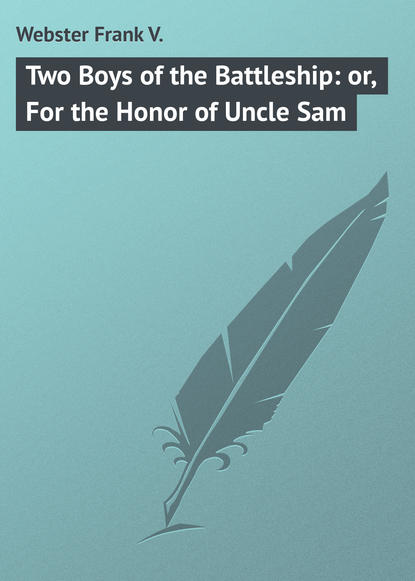По всем вопросам обращайтесь на: info@litportal.ru
(©) 2003-2024.
✖
Two Boys of the Battleship: or, For the Honor of Uncle Sam
Настройки чтения
Размер шрифта
Высота строк
Поля
“Sleep in barracks!” cried one. “Why, I thought we’d be put on board a battleship! That’s what I enlisted for. I can sleep on land in a building, any night.”
The petty officer smiled. Doubtless he was used to hearing that.
“You’ll only sleep in barracks while you’re training here,” he answered. “You have to be shown something about a battleship and other naval matters before you’re qualified to go on board. Don’t worry, you’ll have all the sleeping aboard a ship that you want. It will all come in time.”
“That’s good news,” said Ned to Frank.
“Oh, I knew this was only temporary,” was the answer.
“It takes about four months,” the petty officer said, overhearing Frank’s remark.
“Thank you.”
A little later the two brothers, as well as the other recruits, were led into the presence of the medical officer and his assistants.
“Strip!” came the order, and soon the rigorous examination was under way.
Ned and Frank need have had no fears, for they were very promptly passed. Some of their mates, however, did not fare so well, and one or two were rejected, having to leave the prospective service, much to their regret. But our heroes were found physically fit, and, having previously taken the oath of allegiance to the United States, they were now fully qualified and admitted apprentice seamen.
“That’s all,” the medical officer said to them, as he motioned to them to dress. Once more they were taken in charge by a petty officer, a different one this time.
“What’s next?” asked Frank.
“You’ll have your clothing assigned to you, and will learn how to swing your hammocks,” was the answer.
“Are we going to sleep in hammocks while we’re ashore, in the barracks?” Ned wanted to know.
“That’s what you are,” said the guiding officer. “You’ll unlash them every night when you’re piped to do so, and you’ll lash them up, out of the way, every morning, just as if you were aboard a battleship.”
“It’s to get used to it,” suggested Frank.
“Exactly, and so with everything else done here at the training station. We do it as nearly as it’s done on board a man-o’-war as is possible.”
Led by the petty officer into the store department, where the clothing for the apprentice seamen was dealt out, Ned and Frank each received two complete outfits – one for winter and one for summer, consisting of rubber boots and coat, caps, sweater, overcoat, trousers, shoes, underwear – in fact everything necessary.
“You’ve now each received sixty dollars’ worth of clothing for your start in a new life,” commented the officer.
“I’m afraid mine are going to be too big for me,” remarked one newly enlisted lad, who was rather small, though not below the standard.
“There’s a tailor right here on the premises, who’ll make them fit you like the paper on the wall,” said the officer. “And that’s one thing you boys might as well learn first as last. You’ve got to look neat while you’re working for Uncle Sam. He’ll do his part in giving you good clothes and the means to keep them in order. The rest is up to you.”
“I’m glad to hear that,” remarked Frank.
“Same here,” agreed his brother. “If there’s anything I like, it’s to be clean and neat.”
They had both been brought up that way.
If Ned and Frank had imagined that now they had received their outfit of clothing, there was nothing more to be done for a time, they were disappointed, for the petty officer, having arranged with the tailor to make certain alterations in some of the garments, told the recruits they would now be expected to mark each of their articles of wearing apparel with a stencil, so that each one would always know which was his.
“And when that is done you’ll have a few instructions in folding your things and stowing them away in your bag.”
“Fold our things!” exclaimed Ned. “Why can’t we hang them up? They’ll get all wrinkled if we fold them.”
“Not if you fold them the way I show you,” was the reply.
The officer then led the new recruits to the barracks, where each one was assigned to a certain hammock in the dormitory on the second floor. There were hammock hooks on the walls, just as there are on board a ship, and in a little while Ned, Frank and the others, after they had stenciled their clothes, were shown how to unlash the hammocks which were trussed up neatly out of the way.
Then they were given instructions in putting away the hammocks in ship-shape fashion.
“I’ve never slept in a hammock, except to doze off on an afternoon of a summer day under the trees,” remarked Frank.
“Neither have I. I wonder how I’ll like it?” returned his brother.
“Oh, there isn’t any finer bed going!” exclaimed the petty officer, enthusiastically. “You’ll find them comfortable here, even in barracks, but when you get aboard a ship, and find your hammock swaying to the motion, why say! you’ll be sorry to hear the breakfast call!”
“Not much I won’t!” exclaimed a fat, jolly-looking lad who probably had a good appetite.
Ned and Frank had noticed that the hammocks provided at the navy yard barracks of the Norfolk training station were not like the ordinary hammock in which magazine illustrators like to depict pretty girls with a book and a box of candy. The sailors’ hammocks were made of stout canvas, and each one was provided with a well-made hair mattress. The United States isn’t taking any chances on his boys’ going without a good night’s sleep. It makes every provision for their reasonable comfort, though there are no “fal-de-lals,” as Ned observed.
“But then, who wants them?” asked Frank.
“Certainly no one on a battleship,” answered his brother.
In addition to the mattress in the hammock there were two woolen blankets of good quality.
“You’ll never be cold, especially on board ship,” said the sergeant, “and when you want to be cool, just don’t use the blankets, that’s all. It’s the simplest and best bed in the world.”
Frank and Ned were beginning to believe this. They were already very favorably impressed with their new life, or, rather, its beginning. Of course they realized that hard work and plenty of it was in store for them.
They had enlisted for a term of four years. They could not resign before their term of enlistment was over if something did not suit them, and they would be subject to certain specified hours. But, as the petty officer told them, there was plenty of liberty allowed, and there were all sorts of recreations, such as swimming, boating, fencing, football, and other athletics. Then, too, they received free board, lodging and medical attention, and they were paid $17.50 a month, which could all be saved, not a penny of expense being called for except what was wanted for extras.
“And if you show yourselves capable, and learn quickly,” their friend, the sergeant, told them, “you’ll soon be earning more. Ordinary seamen get $20.90 a month, seamen $24.60, and – ”
“Say, what do gunners get?” asked impulsive Ned.
“Well, anywhere from $1,500 to $2,400 a year,” he answered. “And I want to say right now that if a lad is qualified he can get to that post, if he works hard.”
“Then I’m going to work hard!” declared Ned.
“Same here,” echoed his brother.
“That’s the kind of talk we like to listen to,” commented the sergeant. “Aim as high as you can, and hit the bull’s-eye!”
“Huh! Some folks are trying to crow before they’re out of the shell very long,” remarked a red-haired recruit, with a rather unpleasant face. He had seemed sullen ever since arriving at the training station, and the remarks of Frank and Ned seemed to anger him.
“What’s the matter with you?” asked the sergeant. “Some one step on your corns?”
“No, but it makes me mad to hear kids that don’t know a half hitch from a square knot talking about getting in the gunners’ class!”










